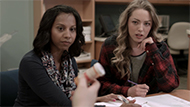Planning for Alcohol or Drug Relapse
Topic Overview
Stopping substance use, whether it's alcohol or drugs you are using, is very hard. Very few people succeed the first time they try. A lapse or relapse is likely.
- A lapse is the first time you use a drug or alcohol again after you have quit, or brief episodes of use at later points.
- A relapse is not being able to stay drug-free or sober over time. It can occur if you have a series of lapses close together or a lapse that leads to heavier drug or alcohol use over a longer period. It is most likely to happen a few months after you have quit using drugs or alcohol.
A lapse or relapse doesn't mean you or your treatment has failed. It may mean that you just slipped up. If this is true for you, accept the mistake and move on. Try to find out why you relapsed and make changes in your life so that it won't happen again. You also may need more treatment, another type of treatment, or more time in support groups such as Narcotics Anonymous or Alcoholics Anonymous.
You might have several relapses, whether you have tried to quit substance use on your own or have had treatment. As time goes on, relapses usually occur less often and are shorter. It's also possible to never have a relapse.
Have a relapse plan
Accept that you may have a relapse. If you think about what to do about a relapse before it happens, it may be easier to deal with.
Talk to people involved in your recovery about what to do if you have a relapse. These people may include your doctor, counselor, family, friends, and support group sponsor. Decide who you can call, where you can go, and what to do if there is a problem. People you can turn to include your sponsor, your doctor, your counselor, or a crisis hotline.
Think about your triggers
Triggers are things that might cause you to have a relapse. They may include:
- Certain people. Running into people you drank or used drugs with could trigger memories and a desire to use drugs or alcohol again. If you meet these people, they could urge you to use drugs or alcohol.
- Certain places. Walking into a bar, a friend's house, or a park where you drank or used drugs could trigger a craving. Even being in the same kind of area could cause cravings.
- Certain things. You may link objects to drug or alcohol use. For example, seeing a syringe or crack pipe could trigger memories.
- Certain times. Certain days or times of day, holidays, or weather could trigger a craving. It depends on your memories of drug or alcohol use.
- Certain smells, sounds, and sensations. The smell of the drug, cigarette, or a food could be a trigger. A rainy day, a song, or a television program could also cause a craving.
- Stress. Stress is a major trigger. Any situation where you feel stress makes a relapse more likely.
- Certain situations. Social activities, parties, or being alone could also make you think about having a drink or looking for drugs.
It may be helpful to write down your triggers and think about them. Are some more likely to cause a relapse than others? Rate your triggers from most likely to cause a relapse to least likely to cause a relapse.
Now decide how to deal with your triggers. You might need to avoid certain situations or people or stay away from a favorite place or activity. If you know you can't avoid a trigger, bring a friend with you for support.
If you lapse or relapse
If you begin using drugs or alcohol again:
- Stop drinking or using the drug at once. Get rid of it. Pour it down the sink or flush it down the toilet. Leave the situation you are in.
- Keep calm. Remember that you have a plan, and remind yourself how hard you've worked to stay sober or drug-free.
- Get support right away. Call the people listed on your plan or go to the places your plan lists.
- When you've stopped drinking or using, think about what happened. Find out what caused you to relapse and how you can prevent it from happening again. Put this into your plan.
If you are thinking about drinking or using a drug, take action. Find support to help you reject the temptation.
Related Information
Credits
ByHealthwise Staff
Primary Medical Reviewer Adam Husney, MD - Family Medicine
Martin J. Gabica, MD - Family Medicine
Kathleen Romito, MD - Family Medicine
Specialist Medical Reviewer Peter Monti, PhD - Alcohol and Addiction
Christine R. Maldonado, PhD - Behavioral Health
Current as ofOctober 9, 2017
- Top of Page
Next Section:
Related Information
Previous Section:
Topic Overview- Top of Page
Next Section:
Credits
Previous Section:
Related Information- Top of Page
Current as of: October 9, 2017


